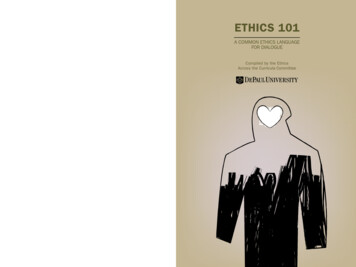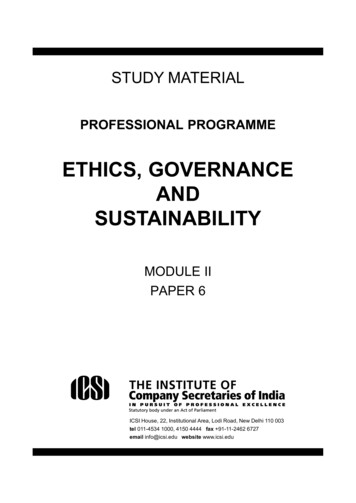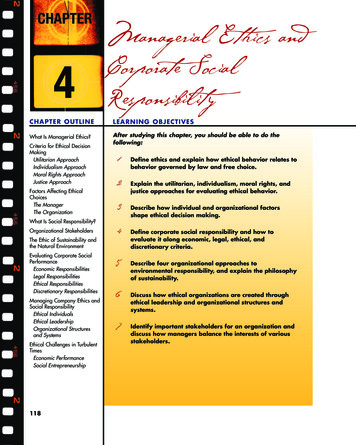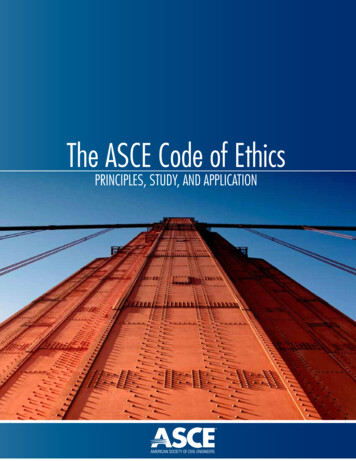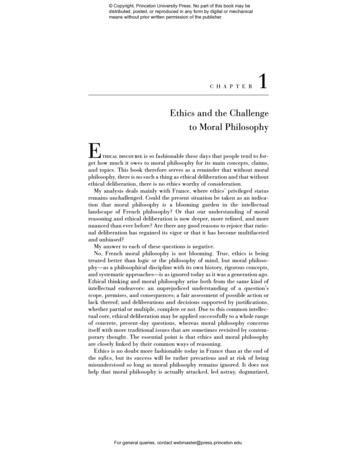
Transcription
Copyright, Princeton University Press. No part of this book may bedistributed, posted, or reproduced in any form by digital or mechanicalmeans without prior written permission of the publisher.C H A P T E R1Ethics and the Challengeto Moral PhilosophyEthical discourse is so fashionable these days that people tend to for get how much it owes to moral philosophy for its main concepts, claims,and topics. This book therefore serves as a reminder that without moralphilosophy, there is no such a thing as ethical deliberation and that withoutethical deliberation, there is no ethics worthy of consideration.My analysis deals mainly with France, where ethics’ privileged statusremains unchallenged. Could the present situation be taken as an indica tion that moral philosophy is a blooming garden in the intellectuallandscape of French philosophy? Or that our understanding of moralreasoning and ethical deliberation is now deeper, more refined, and morenuanced than ever before? Are there any good reasons to rejoice that ratio nal deliberation has regained its vigor or that it has become multifacetedand unbiased?My answer to each of these questions is negative.No, French moral philosophy is not blooming. True, ethics is beingtreated better than logic or the philosophy of mind, but moral philoso phy—as a philosophical discipline with its own history, rigorous concepts,and systematic approaches—is as ignored today as it was a generation ago.Ethical thinking and moral philosophy arise both from the same kind ofintellectual endeavors: an unprejudiced understanding of a question’sscope, premises, and consequences; a fair assessment of possible action orlack thereof; and deliberations and decisions supported by justifications,whether partial or multiple, complete or not. Due to this common intellec tual core, ethical deliberation may be applied successfully to a whole rangeof concrete, present-day questions, whereas moral philosophy concernsitself with more traditional issues that are sometimes revisited by contem porary thought. The essential point is that ethics and moral philosophyare closely linked by their common ways of reasoning.Ethics is no doubt more fashionable today in France than at the end ofthe 1980s, but its success will be rather precarious and at risk of beingmisunderstood so long as moral philosophy remains ignored. It does nothelp that moral philosophy is actually attacked, led astray, dogmatized,For general queries, contact webmaster@press.princeton.edu
Copyright, Princeton University Press. No part of this book may bedistributed, posted, or reproduced in any form by digital or mechanicalmeans without prior written permission of the publisher.4CHAPTER ONEor broken up in self-help moral lessons by so-called friends more harmfulthan its open enemies. In the face of excessive recycling and multiple at tacks, there is only one conclusion to be drawn: among professional Frenchphilosophers, only a few are truly trying to find out what is moral philoso phy, what are its concepts and methods.The first proof of it being so is that the teaching of philosophy in ourhigh schools and universities—with one or two exceptions—lacks a mod ern moral philosophy component. The same could be said of otherbranches of philosophy. The fact is that a general characteristic of all phi losophy courses taught in France—at least to the level of aggregation, thatis, the state examination that certifies secondary school teachers—is thealmost total lack of reference to the twentieth-century history of philoso phy and the very scarce mention of the state of philosophy in other coun tries or of any topics debated among contemporary philosophers. It is asthough one resolved to teach a scientific discipline—or, for that matter, anydiscipline in natural affinity with clarity and argumentation—by vaguelyalluding to its history in the past twenty-five years, ignoring its develop ments in other countries, and leaving one’s students in total darkness asto contemporary debates in that field. As for moral philosophy, the gapbetween educational and intellectual reality is even greater, because thisdiscipline (as defined in the twentieth century) is nowhere to be found intoday’s French universities. The contrast with ethics could not be greater:in France, the teaching of modern moral philosophy has no recognizedplace whatsoever.Another proof comes from the nature of publications claiming to belongto the realm of ethics. Here again, one is bound to notice that almost everyauthor who tackles the subject of morality goes about it in his or her pre ferred idiom—be it postmodern, Kantian, or materialistic—but very rarelytreats moral philosophy as a rational and critical discipline. Most authorsstart from scratch, often dealing zealously with the work of their favoritephilosopher, but remaining oblivious to everything written before them onits subject and rarely mentioning anybody else’s relevant contributions inthe matter. In stark contrast, all reflexive disciplines share in a commonpool of research topics and methods, as well as a whole range of viewpointsand debates that it would be unthinkable not to mention, and withoutwhich new contributions make no sense whatsoever. When recently pub lished works of ethics are avoiding all reference to the state of contempo rary philosophical thought on morality, I doubt that happens because theirauthors are following Rousseau’s famous call to “Leave all books behind.”Rather, it happens because these authors are blissfully unaware of the ac tual thinking going on in their discipline.1The root cause of both the absence of moral philosophy from universitycurricula and the lack of interest shown by French philosophers for con temporary issues in this field lies in our philosophical community’s inabil For general queries, contact webmaster@press.princeton.edu
Copyright, Princeton University Press. No part of this book may bedistributed, posted, or reproduced in any form by digital or mechanicalmeans without prior written permission of the publisher.THE CHALLENGE TO MORAL PHILOSOPHY5ity to distance itself from its own, mainly historical, training and ossifiedcertainties, such as “Good philosophy can only be found in France,” “Mo rality can only be Kantian,” “The history of an issue is all one needs inorder to properly understand it,” “ancient, modern, and present-day phi losophy are well-defined divisions in the history of thought,” “The Mod erns are superior to Ancients in everything,” “Science and technology arethe enemies of philosophy,” “A formal argument is worse than supersti tion.” This is how our philosophers, suspicious of science and non-Frenchthought but sure of having a good grasp on the future of the human mind,delude themselves. Yet, the reality is markedly different. Philosophicalstudies are excellent elsewhere; the Kantian approach is only one amongmany; the history of human thought does not follow a predetermined path(that would just happen to coincide with chronological divisions widelyadopted in the teaching of philosophy in France); philosophy is universalbecause its theses are intelligible and its developments rational. More tell ingly, the history of moral philosophy shows no discernible linear progres sion toward truth or goodness, and rational arguments, including formal ized ones, are at the heart of ethical thinking. Any serious and informedstudy of moral philosophy could have delivered a decisive rebuttal to everydelusional certainty that afflicts contemporary philosophy in France, but,alas, none has been forthcoming. The old conceptual frame still shapes theteaching of philosophy in our universities and any component of moralphilosophy that does not fit in is simply ignored. For all these reasons, itcannot be said in fairness that moral philosophy—as a rigorous disci pline—is blooming in France today.No, there has been no research or analysis attempting to grasp the sig nificance of moral thought. The meaning of the term “moral code” remainsloose and mostly arbitrary. All of a sudden, everybody has awakened tothe urgent need of dealing with ethics. The once sparsely inhabited fieldis now crowded. Until recently, any attempt to reinvigorate moral thinkingwas looked upon with mistrust and scorn. Nowadays, the label “ethics”confers respectability to almost any statement. Its present celebrationcould however be as harmful as was its past neglect. But, while the neglectwas entirely due to ignorance, the actual tendency of indiscriminatelyusing the term “moral” makes the concept unrecognizable, and there fore useless. Both neglect and celebration come from the failure to graspthe essence of moral thought. Stigmatizing or trivializing a researchobject seems to be the easiest way of exempting oneself from analyzing itsspecificity.Let us consider the scenario of a philosophical debate on a moral ques tion. In the absence of a well-argued exchange, each participant wouldadvance his or her own philosophical beliefs and, instead of a principleddialogue highlighting the rigor and sophistication of each point of view,one would witness a thunderous clash of irreconcilable opinions. GenerallyFor general queries, contact webmaster@press.princeton.edu
Copyright, Princeton University Press. No part of this book may bedistributed, posted, or reproduced in any form by digital or mechanicalmeans without prior written permission of the publisher.6CHAPTER ONEspeaking, philosophical exchanges about ethics are still viewed as a con frontation whereby each side would rather defend its beliefs and state itsviewpoints than strive to clarify concepts, to qualify its positions, to detectits own vulnerabilities, and to try to fully understand a point of view con trary to its own. This being the case, it cannot be said that French philoso phers are today any better at grasping the essence of moral thought thantheir predecessors.Lastly, practical reasoning is still not a privileged subject of tolerant orpluralist discussion. Rhetorical accusations and denunciations can befound on both sides of the debate. By the end of the 1980s when ethicalthought again became important, the return to moral codes of conductand raising moral standards was angrily denounced as moralizing. It goeswithout saying that no philosopher would favor a reign of moral prejudiceor conformism. Excessive moralizing was therefore properly criticized atthat time. The problem was that the criticism had started before anyoneknew what its object was. Moral thinking has little in common with moralconformism. On the contrary, it may often become the best way of avoidingconformism. This is a topic that I take up again and again in this book,but it should be clear from the start that if moral thinking can be easilydefended against any criticism of moral conformism, it does not followthat it is above all criticism. It is all right to criticize the pretensions ofmoral philosophy, to be suspicious of its hegemonic tendencies, or to ques tion its premises, concepts, or methods. No body of thought can grow andmature if made into a constant object of reverence. The best way to testits value is by exposing it to criticism and questioning. There is, however,a limit beyond which criticism outweighs its usefulness: this happens whenit takes on poorly conceived conclusions and doubtful caricatures aboutits object, or when it deliberately ignores the true nature of its object orwillfully confuses the issues.To illustrate this point, an imaginary conversation could better serveour purpose than a lengthy development of the subject.— One cannot look for moral standards everywhere. In politics, for instance,it is useless to do so.— No doubt, but it all depends on what the meaning of “moral” is. If youmean by it “moral lessons,” then I agree, they are pointless in politics. How ever, politics can be a valid object of ethical or normative analysis.— Not so. Ethics is a matter of commitment and conviction. The morality ofconvictions, which is the only one out there, has nothing to do with politicalthought, which deals with power, complex hierarchies, and consequences.At this point, allow me to interrupt the conversation so as to contest thestealthy definition it gives of “moral.” Moral analysis and political analysisare both part of practical philosophy, also called philosophy of humanFor general queries, contact webmaster@press.princeton.edu
Copyright, Princeton University Press. No part of this book may bedistributed, posted, or reproduced in any form by digital or mechanicalmeans without prior written permission of the publisher.THE CHALLENGE TO MORAL PHILOSOPHY7action. But it would be erroneous to say that moral philosophy is limited toconviction and commitment. Moral philosophy is not limited to defendingopinions. It may be inspired by a conviction, but this is not always thecase. Mainly, it is a reflexive approach, and there is no reason for it toreplace political analysis entirely. But neither is there any reason for arbi trarily detaching it from such an approach, confining it to the realm ofpersonal convictions—or, in more modern terms, treating it as a kind ofsecular religion or complacent humanism.Moral philosophy is not politics, a religion, or a general philosophyabout human beings; rather, it is a mainly intellectual, rational field ofresearch. Only in a limited sense can it be said to be a repository of commit ments, yearnings, or convictions. The value of moral thought is gaugedfirst by its reasons, not by the grandiloquence or emotional appeal of itspremise. The freedom of thought is the first precondition of any thoughtprocess. Thus, one should feel free to evaluate a point of view, criticizea given thesis, suggest counterexamples, or make objections withoutbeing spooked by gloomy overstatements (as in “saying this shows that infact you mean . . .” or “talking about this, even in critical terms, showsyour readiness to accept it”) and by the conjuring up of horrible conse quences such as the loss of all human dignity, the inescapable genocide,or various combinations thereof, and, to cap it all, by alluding to Hitlerand the Nazis.2Many a criticism of moral philosophy is built on a deliberate misreadingof its specificity. Such a misreading is deliberate not only because it isintentional but also because no attempt is ever made to correct itself. Thisis the main reason that such criticism has failed to this day to achieve atrue pluralism. It is undoubtedly difficult to spot the fine line between, onthe one hand, pluralism and nuanced debate aiming to reach the best pos sible explanations and, on the other, unrestrained antagonism. Be that asit may, I still feel that antagonism and the lack of fair exchanges have lefttheir sorry mark on the philosophical debate in France. The propensityfor veneration that begets dogmatism and stifles open and lively debategoes hand in hand with an excess of criticism and denunciation that hasa sterilizing rather than an enriching effect on intellectual debates. It isprecisely this mixture of blind veneration and stubborn misconception thatmakes me doubt the existence of conditions conducive to open and livelydebate in France.In 1992 I wrote an article about the state of research in moral philosophyfor the French review Le Débat.3 The article points out the near disappear ance of moral philosophy from the French intellectual landscape. It men tions the absence of publications, research, and debates on the subject anddeplores the denunciation of morality and the disregard if not disdain forthe idea that philosophers can have a valid contribution to the debate onFor general queries, contact webmaster@press.princeton.edu
Copyright, Princeton University Press. No part of this book may bedistributed, posted, or reproduced in any form by digital or mechanicalmeans without prior written permission of the publisher.8CHAPTER ONEsociety’s issues. Eight years have passed since, and I have to admit thatthe situation has changed in certain cases, at least on the surface. Books,articles, and special issues have been published that give the public, in cluding university students, a general idea of what contemporary moralphilosophy is about. I have myself tried to bring to their attention thecontinuous history of moral ideas, the main topics, the basic principles,and even the style of current debate in this field.4 Among other signs ofchange, one notices the creation of a few discussion groups and a smallcommunity of philosophers interested in the normative aspects of moralthought.If so, then what justifies the doubts I now express? In my view, thesechanges have not really affected the status of moral philosophy in France.The discipline is still mostly absent from university curricula, and veryfew philosophers are aware of it. People interested in philosophy have nomeans of evaluating or criticizing what is published under the heading“moral philosophy.” Worse still, professional philosophers remain largelyunaware of moral philosophy as a discipline, while thoroughly infatuatedwith ethics. A world in which people understand the importance of ethicsis surely preferable to one in which they do not. But this only underlinesthe urgency of the following questions: What are the reasons of this publicomnipresence of ethics? Is it grounded in solid intellectual reality? It isprecisely on this point that I have the greatest doubts and fears. If ethicsis not rooted in philosophical reflection, then the term could be used indis criminately to impress, intimidate, or blame instead of being restricted tothinking and reasoning.5In writing this book, my main purpose has been to thoroughly examinemoral philosophy, to scrutinize its current reality, and to explore the roleit can play in the community of philosophers and French society in general.I aim to show that moral philosophy is the foundation without which con cerns with ethics and moral claims lack seriousness, and that concern forethics is not in itself a guarantee of relevance. To this day, there is nopermanent link between appeals to ethics and moral considerations. More over, the state of moral reflection itself is not entirely satisfactory. Thedoubts and fears expressed earlier arise from a double acknowledgment:moral reflection is often inconsistent, and ethical activism in the form ofproclamations of virtue, commitments, or rebukes shows in most cases noconnection whatsoever with the intellectual undercurrent of moral philos ophy. The major source of legitimacy resides in thought. The developmentof moral philosophy and the awareness of the links binding it to concreteethical deliberation are the principal preconditions for the ability of oursociety to carry out successfully an ethical reflection that is informed, judi cious, fair, and as objective as possible. This is the only way to securea critical role for moral philosophy in helping to better understand andFor general queries, contact webmaster@press.princeton.edu
Copyright, Princeton University Press. No part of this book may bedistributed, posted, or reproduced in any form by digital or mechanicalmeans without prior written permission of the publisher.THE CHALLENGE TO MORAL PHILOSOPHY9appreciate important aspects of the human condition and contemporarythought. A critical approach is particularly useful today, when the infatua tion with ethics—facilitated by the specificity of our world—could be seenas a taste for ready-to-use answers. Such answers could easily be found inwhat I call moralizing. Moral philosophy is altogether different.Hence, the topic of my book: Is there such a thing as a moral philosophyin France? What tasks is it called to perform? What are its pathways anddead ends? How could it define its main issues, challenges, insuperableobstacles, goals? Drawing up a reflexive and critical approach is a difficultand precarious task in philosophy. Success is not assured in advance. Tenyears ago, at the rebirth of moral philosophy, the main intellectual taskwas to help rebuild it as a discipline by reopening the debate on a set ofissues, methods, and concepts that had been forgotten for thirty years andby placing them again at the core of philosophical scrutiny. Today, moralphilosophy must also rid itself of superfluous claims and ambitions thatare incompatible with this task.If moral philosophy is to play a legitimate role in modern criticalthought, it must answer a few challenging questions. Some of those dealwith its history, its neutrality, and its connections with political philosophyand with the real world. They are typical expressions of the need for intro spective reflection in a discipline intent on rigorously defining itself. Oth ers, though, are intentionally stuck in misunderstandings and misconcep tions. Questions raised in this connection usually attack imaginary targetsthat reveal bias more than anything else. Still, they too deserve answersfor seeking some clarifications and explanations. This exercise in refuta tion and rebuttal can sometimes lead to a better understanding of the is sues under consideration. Between stimulating criticism and unfair at tacks, there is, however, a third kind of questions. These are of the“dangerous friend” type. Their harm lies in attempting to assign a role tomoral philosophy that it cannot and should not fulfill, that is, the role ofa modern religion or a science of all things human. Let this be a reminderthat no moral philosophy worthy of its name should ever aspire to becomea secular religion or a philosophy of modernity.A few requisites have been set up arbitrarily as necessary preconditionsof relevance for contemporary moral thought. I intend to introduce themone by one and offer a detailed critical analysis for each. First, though, Iwant to warn the reader against all of them by recalling some examples ofthese allegedly self-evident preconditions for accurate and legitimatemoral thinking: the certitude that moralizing intentions or power strugglesare always the hidden motivating factors of moral thought; the doctrinaireassertion that moral thought and ethics are opposites, the former repre senting the law and the latter, the good behavior; the stubborn belief that,modern ethics being rational and autonomous, it has left behind religion,For general queries, contact webmaster@press.princeton.edu
Copyright, Princeton University Press. No part of this book may bedistributed, posted, or reproduced in any form by digital or mechanicalmeans without prior written permission of the publisher.10CHAPTER ONEwhich is seen as authoritarian and not autonomous; the mistaken beliefthat only atheists can legitimately engage in moral thinking; the unrealisticconviction that modern man is the product of a necessary and univocalprocess of emancipation; the illusion that modernity is a singularity and,as such, is homogeneous and could not have evolved differently from whatit is today; the deluded notion that a phenomenon such as Kantian philoso phy has generated a new kind of reasoning, that Kantian formalism anduniversalism define by themselves the relevance criterion for modernmoral philosophy as a whole, and that everything preceding the Kantianapproach, particularly the thought of Ancients, is therefore out-of-date.However strongly held, these philosophical beliefs are as open to ques tioning as any other substantial commitment to a stated position. They areacceptable as long as they remain subject to discussions, counterevidence,and arguments but become ossified dogma when taken as indisputableand unconditional truths. As articles of faith, though, they are at best un warranted and at worst misguided approximations of ethical thinking.They encourage philosophers and their readers to accept passively com forting illusions and to misunderstand completely the complex intellectualtasks that our world faces today. To me, it seems impossible to preserve aplausible and realistic image of our moral experience without criticizingsuch beliefs and their pretension to be the sole yardstick for valid moralreflection.If my analysis appears to be critical, it is so because it inevitably reflectsat least part of what is presently being said, written, or thought in France.When criticism is used fairly, without libel or abuse, it can become anintellectual duty—all the more so when bias and dogmas threaten to stifledynamic thought.Critique of “Ethical Ideology”: Truths and FalsehoodsHaving deplored the quasi disappearance of moral philosophy, should wealso be worried by the omnipresence of the term “ethics”? Charles Péguythought that the trivialized use of a term heralds its near demise. When aterm becomes widely used in all kinds of contexts with all kinds of mean ings, it will soon lose all meaning. Many have rightfully criticized theabusive usage of “ethics.” In so doing, they helped undo the cocoon ofeasy certitudes and complacencies in which this term is often wrapped.When, by such abusive usage, the term “ethics” becomes unavoidable inall discourse, there is a point beyond which a reversal of such a situationbecomes inevitable. The inflated use of “ethics” can only become distaste ful. Seeing its damaging effect on moral reflection, one almost wishes itwould become so.For general queries, contact webmaster@press.princeton.edu
Copyright, Princeton University Press. No part of this book may bedistributed, posted, or reproduced in any form by digital or mechanicalmeans without prior written permission of the publisher.THE CHALLENGE TO MORAL PHILOSOPHY11Unfortunately, those who are denouncing “ethical ideology” are them selves often making false representations of contemporary ethics. Unliketheir predecessors of the sixties, such so-called defenders of ethical thoughtare uncertain whether to stop or continue discussing it. So, while pro claiming that ethics is worth nothing, they hasten to add that there is anauthentic ethics nonetheless. An assertion such as “the ethics (suggestedby others) is worthless, but the ethics (that I will reveal) is worthy” triesto present a hotchpotch of confused ideas and declarations of intentionsas valid arguments in the debate. Such rhetorical denunciations do notallow for an answer to the only philosophically valid question: What istruly ethics, once the surrounding chatter is removed? Why should we notfollow the example of any other subject field and consider ethics to be abody of knowledge, a conceptual network with a set of principles thatremain valid regardless of the semantic deviations and arbitrary redefini tions to which it is exposed?The little book entitled Ethics that Alain Badiou published in 1993 illus trates quite well this swing motion of denunciation and rehabilitation. Init, the author describes ethics—the dominant philosophical trend at thattime—as a stabilizing influence on the discussion of political, social, orscientific events. Thus, ethics is backed up by institutions (the famousFrench State Committees on ethics) and enjoys an authority of its ownthat the author leaves unspecified.6 The distinctive characteristic of thisstabilizing influence is the concern for propriety and the obsession withconventionality. In his view, ethics is an outline of opinion guided by themotto “You should like only what you have always strongly believed.”7Alain Badiou criticizes that “object” of ethics, which, according to him,amounts to an abstract, statistical consensus that lacks forcefulness: werecognize evil by the suffering it inflicts on its victims. As for the generaland abstract “subject” of ethics, Badiou declares that the victims them selves are its subject.8 The current obsession with evil and fondness forvictims provide ethics with a unique program: the defense of human rights.The tearful concern for the suffering of others can only be understood asthe expression of a fascination with death—typical for our world—basedon the conviction that the only thing that will inevitably happen is death.According to Alain Badiou, the contemporary ethics of a “proper life”comes down to a decision about who dies and who does not.9 He believesthat this explains the infatuation for bioethics and the obsession with eu thanasia. In this sense, the inordinate predilection for ethics exhibited byour contemporaries is seen as a manifestation of nihilism.On this topic though, Badiou’s sound-and-light display does strike aright note: an inflated ethical discourse, fed on the fetishism of humanrights and aggrandized by the rhetoric of an abstract, universal subject,often stiffens moral reflection instead of yielding a better understandingFor general queries, contact webmaster@press.princeton.edu
Copyright, Princeton University Press. No part of this book may bedistributed, posted, or reproduced in any form by digital or mechanicalmeans without prior written permission of the publisher.12CHAPTER ONEof its own specificity. Human rights cannot constitute a morality in and ofthemselves.10 But Badiou’s criticism displays the same self-righteousnessas its target. For a fleeting moment, the certainties of this demystifier seemas unshakable as those of ethical conservatism. Yet soon enough he tooreturns to that which he has always liked and—for this reason—believesto be true. The main point of his criticism is to proclaim once more whathe considers to be a universally known truth, that is, that the main actorin ethics is the public opinion—a universal, nondescript, resigned, andsubmissive victim that a semblance of democracy misleads into believingthat it still has a free will and the power of decision. One might ask: towhat is public opinion submissive? To the economy, of course, comes theanswer. In Badiou’s words, public opinion is submissive to “the logic ofcapitalism,” stating that “our parliamentary systems are satisfied with apublic opinion subjectively constrained to ratify whatever is beforehanddeemed necessary.”11Here, it seems to me, we can recognize the familiar logic of self-pro claimed radical discourse. We
discipline (as defined in the twentieth century) is nowhere to be found in today’s French universities. The contrast with ethics could not be greater: in France, the teaching of modern moral philosophy has no recognized place whatsoever. Another proof comes from the nature o


